一般将来时练习题及答案学习(1)
一般将来时练习题及答案学习(1)

一般将来时一、概念:表示将要发生的动作或存在的状态及打算,计划或准备做某事。
二、基本结构:1、begoingto+do(do为动词原形)2、will+do三、时间标志tomorrow、nextday(week、month、year) soonthedayaftertomorrow(后天)等。
四、否定句:在be动词后面加not或情态动词will后加not成won't例如:I'mgoingtohaveapicnicthisafternoon改为:I'mnotgoingtohaveapicnicthisafternoon.五、一般疑问句:be或will提到句首some改为any;and改为or第一、二人称互换。
例如:Wearegoingtogoonoutingthisweekend.改为:Areyougoingtogoonoutingthisweekend六、对划线部分提问:一般情况,一般将来时的对划线部分有三种情况。
1、问人:who例如:I'mgoingtonewYorksoon改为:Who'sgoingtonewYorksoon2、问干什么:what…..do例如:Myfatherisgoingtowatcharacewithmethisafternoon改为:Whatisyourfathergoingtodowithyouthisafternoon3、问什么时候:when例如:She'sgoingtogotobedatnine改为:Whenisgoingtobed六、同义句:begoingto=willI amgoingtogoswimmingtomorrow=I'willgoswimmingtomorrow一般将来时练习题一、填空1、我打算明天和朋友去野餐.I__________________haveapicnicwithmyfriendsI____haveapicnicwithmyfriends2、What____________________nextMondayI_____________playbasketball.what______youdonextMondayI____playbasketball.3、你妈妈这个周末去购物吗是,她要去买些水果。
一般将来时练习题(含答案)
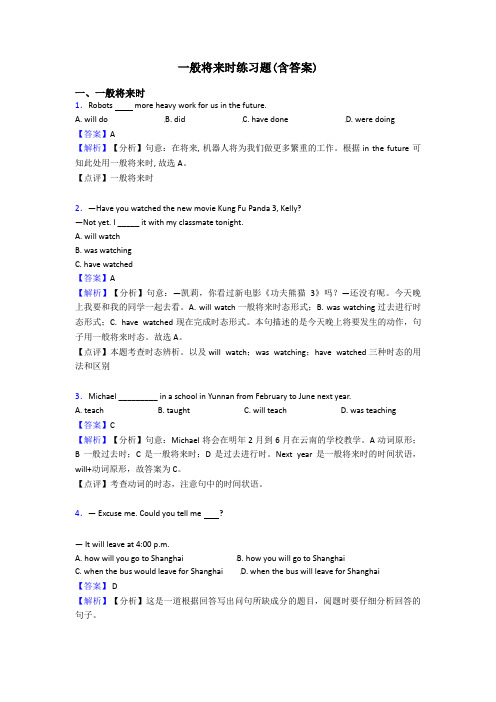
一般将来时练习题(含答案)一、一般将来时1.Robots more heavy work for us in the future.A. will doB. didC. have doneD. were doing【答案】A【解析】【分析】句意:在将来, 机器人将为我们做更多繁重的工作。
根据in the future 可知此处用一般将来时, 故选A。
【点评】一般将来时2.—Have you watched the new movie Kung Fu Panda 3, Kelly?—Not yet. I _____ it with my classmate tonight.A. will watchB. was watchingC. have watched【答案】A【解析】【分析】句意:—凯莉,你看过新电影《功夫熊猫3》吗?—还没有呢。
今天晚上我要和我的同学一起去看。
A. will watch一般将来时态形式;B. was watching过去进行时态形式;C. have watched现在完成时态形式。
本句描述的是今天晚上将要发生的动作,句子用一般将来时态。
故选A。
【点评】本题考查时态辨析。
以及will watch;was watching;have watched三种时态的用法和区别3.Michael _________ in a school in Yunnan from February to June next year.A. teachB. taughtC. will teachD. was teaching【答案】C【解析】【分析】句意:Michael将会在明年2月到6月在云南的学校教学。
A动词原形;B一般过去时;C是一般将来时;D是过去进行时。
Next year是一般将来时的时间状语,will+动词原形,故答案为C。
【点评】考查动词的时态,注意句中的时间状语。
4.— Excuse me. Could you tell me ?— It will leave at 4:00 p.m.A. how will you go to ShanghaiB. how you will go to ShanghaiC. when the bus would leave for ShanghaiD. when the bus will leave for Shanghai【答案】 D【解析】【分析】这是一道根据回答写出问句所缺成分的题目,阅题时要仔细分析回答的句子。
英语一般将来时专题练习(及答案)含解析
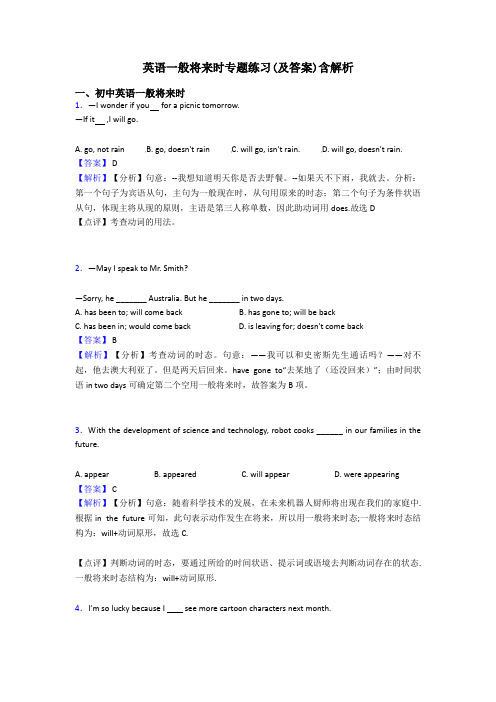
英语一般将来时专题练习(及答案)含解析一、初中英语一般将来时1.—I wonder if you for a picnic tomorrow.—If it ,I will go.A. go, not rainB. go, doesn't rainC. will go, isn't rain.D. will go, doesn't rain.【答案】 D【解析】【分析】句意:--我想知道明天你是否去野餐。
--如果天不下雨,我就去。
分析:第一个句子为宾语从句,主句为一般现在时,从句用原来的时态;第二个句子为条件状语从句,体现主将从现的原则,主语是第三人称单数,因此助动词用does.故选D【点评】考查动词的用法。
2.—May I speak to Mr. Smith?—Sorry, he _______ Australia. But he _______ in two days.A. has been to; will come backB. has gone to; will be backC. has been in; would come backD. is leaving for; doesn't come back【答案】 B【解析】【分析】考查动词的时态。
句意:——我可以和史密斯先生通话吗?——对不起,他去澳大利亚了。
但是两天后回来。
have gone to“去某地了(还没回来)”;由时间状语in two days可确定第二个空用一般将来时,故答案为B项。
3.With the development of science and technology, robot cooks ______ in our families in the future.A. appearB. appearedC. will appearD. were appearing【答案】 C【解析】【分析】句意:随着科学技术的发展,在未来机器人厨师将出现在我们的家庭中. 根据in the future可知,此句表示动作发生在将来,所以用一般将来时态;一般将来时态结构为:will+动词原形,故选C.【点评】判断动词的时态,要通过所给的时间状语、提示词或语境去判断动词存在的状态. 一般将来时态结构为:will+动词原形.4.I’m so lucky because I see more cartoon characters next month.A. is able toB. will be able toC. be able toD. was able to【答案】B【解析】【分析】句意:我真幸运因为我下个月能看到更多的卡通人物。
一般将来时练习题及答案
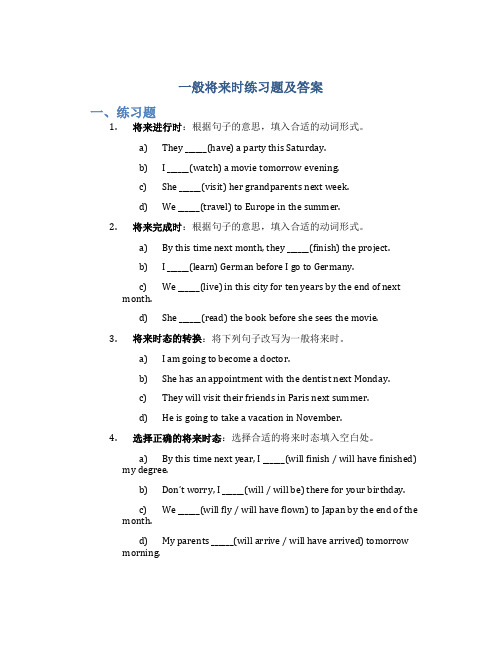
一般将来时练习题及答案一、练习题1.将来进行时:根据句子的意思,填入合适的动词形式。
a)They ______(have) a party this Saturday.b)I ______(watch) a movie tomorrow evening.c)She ______(visit) her grandparents next week.d)We ______(travel) to Europe in the summer.2.将来完成时:根据句子的意思,填入合适的动词形式。
a)By this time next month, they ______(finish) the project.b)I ______(learn) German before I go to Germany.c)We ______(live) in this city for ten years by the end of nextmonth.d)She ______(read) the book before she sees the movie.3.将来时态的转换:将下列句子改写为一般将来时。
a)I am going to become a doctor.b)She has an appointment with the dentist next Monday.c)They will visit their friends in Paris next summer.d)He is going to take a vacation in November.4.选择正确的将来时态:选择合适的将来时态填入空白处。
a)By this time next year, I ______(will finish / will have finished)my degree.b)Don’t worry, I ______(will / will be) there for your birthday.c)We ______(will fly / will have flown) to Japan by the end of themonth.d)My parents ______(will arrive / will have arrived) tomorrowmorning.二、答案1.将来进行时a)They will be having a party this Saturday.b)I will be watching a movie tomorrow evening.c)She will be visiting her grandparents next week.d)We will be traveling to Europe in the summer.2.将来完成时a)By this time next month, they will have finished the project.b)I will have learned German before I go to Germany.c)We will have lived in this city for ten years by the end of nextmonth.d)She will have read the book before she sees the movie.3.将来时态的转换a)I will become a doctor.b)She will have an appointment with the dentist next Monday.c)They will visit their friends in Paris next summer.d)He will take a vacation in November.4.选择正确的将来时态a)By this time next year, I will have finished my degree.b)Don’t worry, I will be there for your birthday.c)We will fly to Japan by the end of the month.d)My parents will arrive tomorrow morning.以上是一般将来时的练习题及答案。
【英语】一般将来时基础练习题及答案(1)

【英语】一般将来时基础练习题及答案(1)一、单项选择一般将来时1.— Mr. Gordon asked me to remind you of the meeting this afternoon. Don't you forget it!— Ok, I .A.won't B.don't C.will D.do【答案】A【解析】试题分析:考查时态。
句意:—戈登先生要求我提醒他今天下午要开会。
你千万别忘记了!—好的,我不会忘记的。
根据句意说明使用否定式,而且是说明的以后的事情,要使用将来时。
故A正确。
考点:考查时态2.If their marketing plans succeed, they ________ their sales by 20 percent.A.will increase B.have been increasingC.have increased D.would be increasing【答案】A【解析】句意:要是他们的市场计划成功了,他们将增加20%的销售额。
从句是一般现在时表将来,主句常用一般将来时或情态动词can/may+动词原形。
3.“When he _____ is not known yet.” “But when he ____, he will be warmly welcomed.”A.comes, comes B.will come, will comeC.comes, will come D.will come, comes【答案】D【解析】试题分析:考查时态:第一个when引导的主语从句,用将来时,第二个when引导的时间状语从句,用一般现在时代替一般将来时,句意:他什么时候来还不知道。
但当他回来时,他会收到热烈的欢迎。
选D。
考点:考查时态语态点评:时间条件状语从句的时态不能用一般将来时,而用一般现在时代替,考查时态还要注意语态。
一般将来时练习题及答案
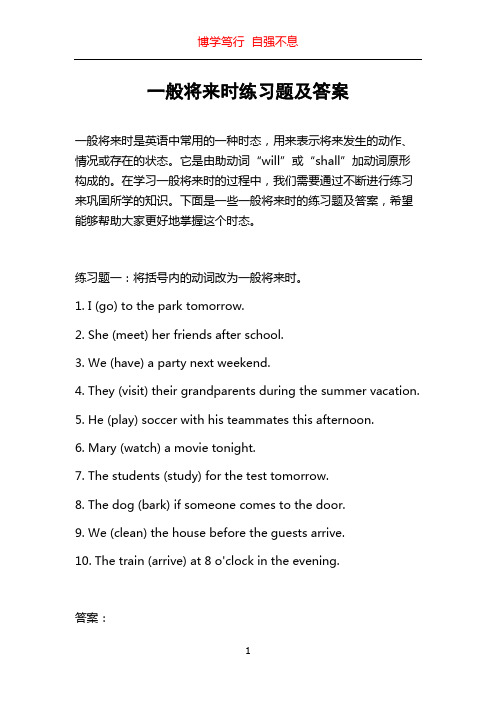
一般将来时练习题及答案一般将来时是英语中常用的一种时态,用来表示将来发生的动作、情况或存在的状态。
它是由助动词“will”或“shall”加动词原形构成的。
在学习一般将来时的过程中,我们需要通过不断进行练习来巩固所学的知识。
下面是一些一般将来时的练习题及答案,希望能够帮助大家更好地掌握这个时态。
练习题一:将括号内的动词改为一般将来时。
1. I (go) to the park tomorrow.2. She (meet) her friends after school.3. We (have) a party next weekend.4. They (visit) their grandparents during the summer vacation.5. He (play) soccer with his teammates this afternoon.6. Mary (watch) a movie tonight.7. The students (study) for the test tomorrow.8. The dog (bark) if someone comes to the door.9. We (clean) the house before the guests arrive.10. The train (arrive) at 8 o'clock in the evening.答案:1. will go2. will meet3. will have4. will visit5. will play6. will watch7. will study8. will bark9. will clean10. will arrive练习题二:根据提示完成下列对话,使用一般将来时。
A: Hi, Lisa! What (you/do) this weekend?B: I (visit) my grandparents. They live in the countryside. A: That sounds nice. How long (you/stay) there?B: I (stay) for two days. I'll come back on Sunday evening. A: Have a great time!答案:A: Hi, Lisa! What will you do this weekend?B: I will visit my grandparents. They live in the countryside. A: That sounds nice. How long will you stay there?B: I will stay for two days. I'll come back on Sunday evening. A: Have a great time!练习题三:选择正确的动词形式填空。
英语一般将来时练习题及答案

英语一般将来时练习题及答案一、单项选择一般将来时1.--How about buying Tim a mobile phone ? After all, he isn’t a boy any more.--I think it’s necessary, for we sometimes want to make sure if he ____ for dinner.A.will come B.comes C.has come D.would come【答案】A【解析】试题分析:考查动词时态。
句意:给他提姆买个手机怎么样?毕竟他不再是个孩子了。
我认为是必要的,因为我们有时会想确认他是否会回来吃饭。
根据句意这是一个宾语从句,确认他是否将回来吃饭,是一般将来时, A. will come一般将来时 B. comes一般现在时 C. has come现在完成时 D. would come过去将来时,所以A正确。
考点:考查动词时态。
2.If you _____ his wife’s income____ his own,the total of their income _____ 3000 yuan.A.add; to; will add up to B.add; to; adds toC.add up; to; adds up to D.will add; for; adds up【答案】A【解析】试题分析:考查if引导条件状语从句及词的用法。
主句用一般将来时,从句用一般现在时表将来。
排除D。
Add...to 把...加在..., add up to总计达, add to增添。
句意:如果把他妻子的收入和他的收入加起来,总计达3000元。
考点:考查if引导条件状语从句及词的用法点评:if引导条件状语从句主句用一般将来时,从句用一般现在时表将来。
3.If our marketing plan succeeds, we _______ the sales by thirty percent next year.A.would increase B.will increaseC.would have increased D.will be increasing【答案】B【解析】试题分析:考查时态。
(英语)英语一般将来时专题训练答案及解析

(英语)英语一般将来时专题训练答案及解析一、初中英语一般将来时1.Mr. Smith our school next year.A. will visitB. visitsC. was visitingD. visited【答案】 A【解析】【分析】句意:史密斯先生下一年将参观我们的学校。
根据时间状语next year判断,时态为一般将来时态,故答案为A。
【点评】考查动词时态,本题涉及一般将来时的应用,表示在将来某个时间将要发生的动作或存在的状态。
2.I’m so lucky because I see more cartoon characters next month.A. is able toB. will be able toC. be able toD. was able to【答案】B【解析】【分析】句意:我真幸运因为我下个月能看到更多的卡通人物。
next month表将来,因此用will be able to。
故选B。
【点评】考查一般将来时。
3.—Have you watched the new movie Kung Fu Panda 3, Kelly?—Not yet. I _____ it with my classmate tonight.A. will watchB. was watchingC. have watched【答案】A【解析】【分析】句意:—凯莉,你看过新电影《功夫熊猫3》吗?—还没有呢。
今天晚上我要和我的同学一起去看。
A. will watch一般将来时态形式;B. was watching过去进行时态形式;C. have watched现在完成时态形式。
本句描述的是今天晚上将要发生的动作,句子用一般将来时态。
故选A。
【点评】本题考查时态辨析。
以及will watch;was watching;have watched三种时态的用法和区别4.Look on the bright side of life,and imagine that you ______ a happy and successful future.A. hadB. will haveC. haveD. have had【答案】 B【解析】【分析】考查时态.句意"看看生活中美好的一面,想象你会有一个幸福和成功的未来.".A过去时.B一般将来时态.C动词原形.D现在完成时态.结合语境"看看生活中美好的一面,想象你___一个幸福和成功的未来.",由future未来,可知,表示将来,用一般将来时态.答案是B.5.— There ________a football match on TV tonight. I can't wait to watch it.— Me, too. It's ________ Guangzhou Evergrande and the Australian team Melbourne Victory.A. will be; betweenB. will be; bothC. will have; betweenD. will have; both【答案】A【解析】【分析】句意为:---今晚将有一场电视直播足球比赛,我非常想看。
英语一般将来时经典练习题(含答案)

英语一般将来时经典练习题(含答案)1.There will XXX.2.Charlie won't work here next month.3.He is very busy this week。
but he will be free next week.4.There will be a dolphin show in the XXX.5.Are you going to be free tomorrow。
No。
I will be free the day after tomorrow.6.Mother will give me a nice present on my next birthday.7.No。
please don't.8.I will get it for you at once。
1.明天下午将会有一个会议。
2.下个月XXX不会在这里工作。
3.他这个星期非常忙,但是下个星期他会有空。
4.明天晚上动物园里将会有一场海豚表演。
5.你明天会有空吗?不,我后天会有空。
6.我的母亲会在我的下一个生日送我一份漂亮的礼物。
7.不,请不要。
8.我会立刻为你拿到早报。
9.Will there be a concert next Saturday?10.If they come。
we will have a meeting.11.He will give her a beautiful hat on her next birthday.12.He will write to us as soon as he gets there.13.He will come back in three days.14.If it doesn't rain tomorrow。
we'll go roller-skating.15.No。
they won't go to see the XXX.16.Who will we go XXX?17.We will do the work this way next time.18.Tomorrow。
【英语】 英语一般将来时专题练习(及答案)及解析
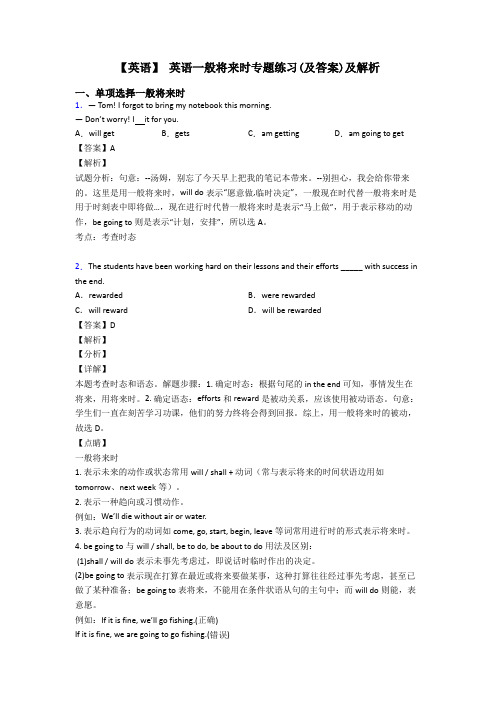
【英语】英语一般将来时专题练习(及答案)及解析一、单项选择一般将来时1.— Tom! I forgot to bring my notebook this morning.—Don’t worry! I it for you.A.will get B.gets C.am getting D.am going to get 【答案】A【解析】试题分析:句意:--汤姆,别忘了今天早上把我的笔记本带来。
--别担心,我会给你带来的。
这里是用一般将来时,will do表示“愿意做,临时决定”,一般现在时代替一般将来时是用于时刻表中即将做…,现在进行时代替一般将来时是表示“马上做”,用于表示移动的动作,be going to则是表示“计划,安排”,所以选A。
考点:考查时态2.The students have been working hard on their lessons and their efforts _____ with success in the end.A.rewarded B.were rewardedC.will reward D.will be rewarded【答案】D【解析】【分析】【详解】本题考查时态和语态。
解题步骤:1. 确定时态:根据句尾的in the end可知,事情发生在将来,用将来时。
2. 确定语态:efforts和reward是被动关系,应该使用被动语态。
句意:学生们一直在刻苦学习功课,他们的努力终将会得到回报。
综上,用一般将来时的被动,故选D。
【点睛】一般将来时1. 表示未来的动作或状态常用will / shall + 动词(常与表示将来的时间状语边用如tomorrow、next week等)。
2. 表示一种趋向或习惯动作。
例如:We’ll die without air or water.3. 表示趋向行为的动词如come, go, start, begin, leave等词常用进行时的形式表示将来时。
【英语】一般将来时练习(含答案)

【英语】一般未来时练习( 含答案 )一、单项选择一般未来时1.Sarah ______ for Beijing tomorrow, so she can’ t go to have a picnic with us.A. had left B.has leftC. is being left D. is leaving【答案】D【分析】试题剖析 :句意: Sarah 明日就要起程去北京了,因此他不可以和我们一同去野餐了。
依据tomorrow 判断句子表示未来,而选项中只有 D 选项能够用此刻进行时表示将要发生的事情,选 D。
考点:考察动词时态。
2.If their marketing plans succeed, they ________ their sales by 20 percent.A. will increase B.have been increasingC. have increased D. would be increasing【答案】 A【分析】句意:假如他们的市场计划成功了,他们将增添20%的销售额。
从句是一般此刻时表将来,主句常用一般未来时或神态动词can/may +动词原形。
3.Half the world’ s population ______ water shortages within 15 years according to the World Bank, just one of many recent alarming reports on the world’ s fresh water supply. A. are suffering B. have been suffered C. will suffer D. were suffered【答案】 C【分析】试题剖析:依据时间状语within 15 years ,故用一般未来时。
考点:时态考察题评论:经过时间状语,上下句意思和详细语境来确准时态。
(语法)一般将来时练习题及答案
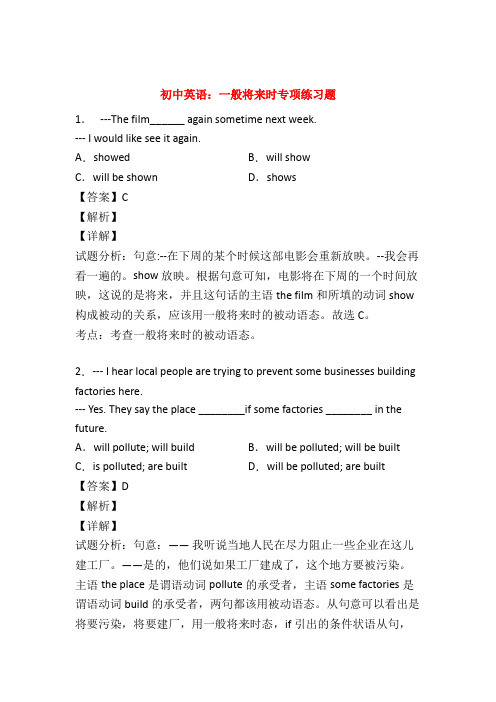
初中英语:一般将来时专项练习题1. ---The film______ again sometime next week.--- I would like see it again.A.showed B.will showC.will be shown D.shows【答案】C【解析】【详解】试题分析:句意:--在下周的某个时候这部电影会重新放映。
--我会再看一遍的。
show 放映。
根据句意可知,电影将在下周的一个时间放映,这说的是将来,并且这句话的主语the film和所填的动词show 构成被动的关系,应该用一般将来时的被动语态。
故选C。
考点:考查一般将来时的被动语态。
2.--- I hear local people are trying to prevent some businesses building factories here.--- Yes. They say the place ________if some factories ________ in the future.A.will pollute; will build B.will be polluted; will be built C.is polluted; are built D.will be polluted; are built【答案】D【解析】【详解】试题分析:句意:―― 我听说当地人民在尽力阻止一些企业在这儿建工厂。
――是的,他们说如果工厂建成了,这个地方要被污染。
主语the place是谓语动词pollute的承受者,主语some factories是谓语动词build的承受者,两句都该用被动语态。
从句意可以看出是将要污染,将要建厂,用一般将来时态,if引出的条件状语从句,要用一般现在时态来表示将要发生的动作。
所以,前面用一般将来时的被动语态形式,后面用一般现在时态的被动语态形式。
故选D。
考点:考查动词的时态及语态辨析。
英语一般将来时专题(含答案)含答案解析百度文库
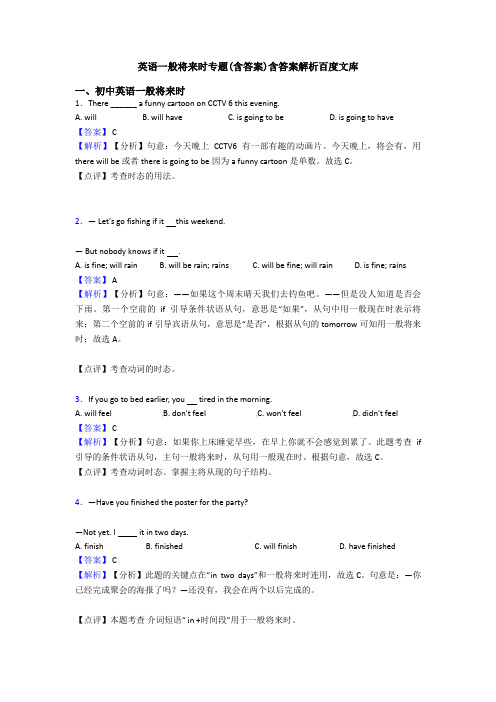
英语一般将来时专题(含答案)含答案解析百度文库一、初中英语一般将来时1.There ______ a funny cartoon on CCTV 6 this evening.A. willB. will haveC. is going to beD. is going to have【答案】 C【解析】【分析】句意:今天晚上CCTV6有一部有趣的动画片。
今天晚上,将会有,用there will be 或者there is going to be因为a funny cartoon是单数。
故选C。
【点评】考查时态的用法。
2.— Let's go fishing if it this weekend.— But nobody knows if it .A. is fine; will rainB. will be rain; rainsC. will be fine; will rainD. is fine; rains 【答案】 A【解析】【分析】句意:——如果这个周末晴天我们去钓鱼吧。
——但是没人知道是否会下雨。
第一个空前的if引导条件状语从句,意思是“如果”,从句中用一般现在时表示将来;第二个空前的if引导宾语从句,意思是“是否”,根据从句的tomorrow可知用一般将来时;故选A。
【点评】考查动词的时态。
3.If you go to bed earlier, you tired in the morning.A. will feelB. don't feelC. won't feelD. didn't feel【答案】 C【解析】【分析】句意:如果你上床睡觉早些,在早上你就不会感觉到累了。
此题考查if 引导的条件状语从句,主句一般将来时,从句用一般现在时。
根据句意,故选C。
【点评】考查动词时态。
掌握主将从现的句子结构。
4.—Have you finished the poster for the party?—Not yet. I it in two days.A. finishB. finishedC. will finishD. have finished【答案】 C【解析】【分析】此题的关键点在“in two days”和一般将来时连用,故选C。
(完整word版)一般将来时练习题及答案学习(可编辑修改word版)

A.arehavingB.aregoingtohaveC.willhavingD.isgoingtohave
()22.
you
freenextSunday?
A.Will;areB.Will;beC.Do;beD.Are;be
()23.Hethereattentomorrowmorning.
A.doB.willdoC.goingtodoD.willdoing
()18.Tomorrowheinthepark.
akiteintheopenairfirst,andthen
boating
A.willfly;willgoB.willfly;goesC.isgoingtofly;willgoesD.flies;willgo
()28.–Let’sgoouttoplayfootball,shallwe?–OK.I.
eD.amcoming
()29.ItusalongtimetolearnEnglishwell.
A.takesB.willtakeC.spendsD.willspend
②Theboyistogotoschooltomorrow.这个男孩明天要去上学。四.“beaboutto+动词原形”表示即将发生的动作,意为:很快,
马上。后面一般不跟时间状语。例如:
Weareabouttoleave.我们马上就走。
五.某些词,如come,go,leave,arrive,start,get,
A.Yes,pleaseB.Yes,youwill.C.No,please.D.No,youwon’t.
()26.Ittheyearofthehorsenextyear.
【英语】 一般将来时练习题(含答案)经典1
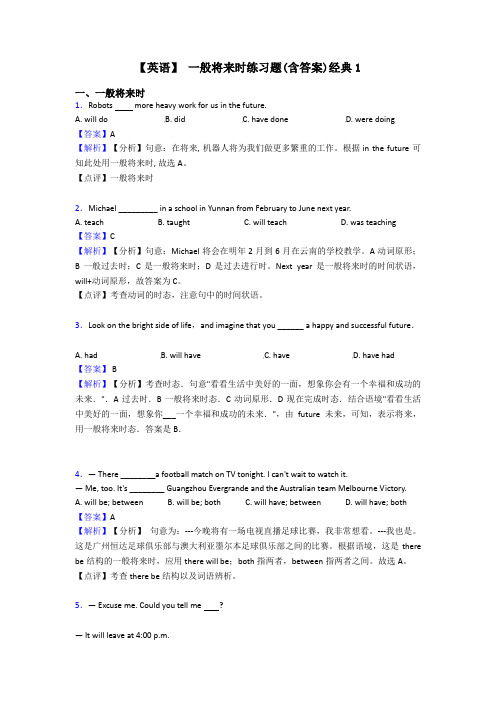
【英语】一般将来时练习题(含答案)经典1一、一般将来时1.Robots more heavy work for us in the future.A. will doB. didC. have doneD. were doing【答案】A【解析】【分析】句意:在将来, 机器人将为我们做更多繁重的工作。
根据in the future 可知此处用一般将来时, 故选A。
【点评】一般将来时2.Michael _________ in a school in Yunnan from February to June next year.A. teachB. taughtC. will teachD. was teaching【答案】C【解析】【分析】句意:Michael将会在明年2月到6月在云南的学校教学。
A动词原形;B一般过去时;C是一般将来时;D是过去进行时。
Next year是一般将来时的时间状语,will+动词原形,故答案为C。
【点评】考查动词的时态,注意句中的时间状语。
3.Look on the bright side of life,and imagine that you ______ a happy and successful future.A. hadB. will haveC. haveD. have had【答案】 B【解析】【分析】考查时态.句意"看看生活中美好的一面,想象你会有一个幸福和成功的未来.".A过去时.B一般将来时态.C动词原形.D现在完成时态.结合语境"看看生活中美好的一面,想象你___一个幸福和成功的未来.",由future未来,可知,表示将来,用一般将来时态.答案是B.4.— There ________a football match on TV tonight. I can't wait to watch it.— Me, too. It's ________ Guangzhou Evergrande and the Australian team Melbourne Victory.A. will be; betweenB. will be; bothC. will have; betweenD. will have; both【答案】A【解析】【分析】句意为:---今晚将有一场电视直播足球比赛,我非常想看。
一般将来时题目20道含答案
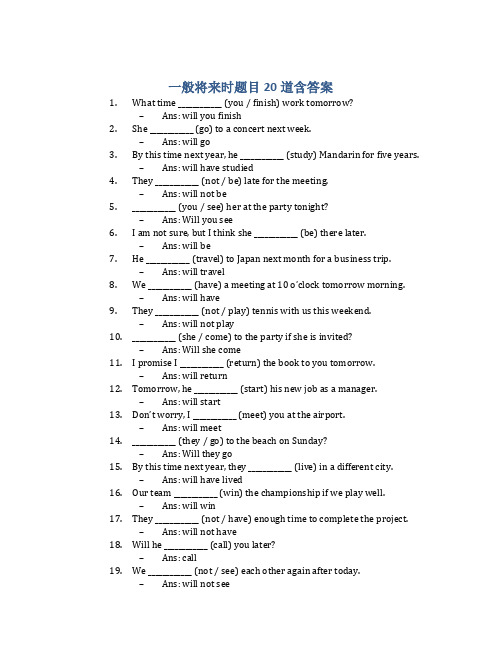
一般将来时题目20道含答案1.What time ____________ (you / finish) work tomorrow?–Ans: will you finish2.She ____________ (go) to a concert next week.–Ans: will go3.By this time next year, he ____________ (study) Mandarin for five years.–Ans: will have studied4.They ____________ (not / be) late for the meeting.–Ans: will not be5.____________ (you / see) her at the party tonight?–Ans: Will you see6.I am not sure, but I think she ____________ (be) there later.–Ans: will be7.He ____________ (travel) to Japan next month for a business trip.–Ans: will travel8.We ____________ (have) a meeting at 10 o’clock tomorrow morning.–Ans: will have9.They ____________ (not / play) tennis with us this weekend.–Ans: will not play10.____________ (she / come) to the party if she is invited?–Ans: Will she come11.I promise I ____________ (return) the book to you tomorrow.–Ans: will return12.Tomorrow, he ____________ (start) his new job as a manager.–Ans: will start13.Don’t worry, I ____________ (meet) you at the airport.–Ans: will meet14.____________ (they / go) to the beach on Sunday?–Ans: Will they go15.By this time next year, they ____________ (live) in a different city.–Ans: will have lived16.Our team ____________ (win) the championship if we play well.–Ans: will win17.They ____________ (not / have) enough time to complete the project.–Ans: will not have18.Will he ____________ (call) you later?–Ans: call19.We ____________ (not / see) each other again after today.–Ans: will not see20.By the time they arrive, we ____________ (prepare) everything for theparty.–Ans: will have prepared以上是一般将来时的20个练习题及答案。
- 1、下载文档前请自行甄别文档内容的完整性,平台不提供额外的编辑、内容补充、找答案等附加服务。
- 2、"仅部分预览"的文档,不可在线预览部分如存在完整性等问题,可反馈申请退款(可完整预览的文档不适用该条件!)。
- 3、如文档侵犯您的权益,请联系客服反馈,我们会尽快为您处理(人工客服工作时间:9:00-18:30)。
一般将来时一、概念:表示将要发生的动作或存在的状态及打算,计划或准备做某事。
二、基本结构:1、begoingto+do (do 为动词原形)2、will+do三、时间标志tomorrow 、nextday(week 、month 、year)soonthedayaftertomorrow(后天)等。
四、否定句:在be 动词后面加not 或情态动词will 后加not 成won't 例如:I'mgoingtohaveapicnicthisafternoon 改为:I'mnotgoingtohaveapicnicthisafternoon. 五、一般疑问句:be 或will 提到句首some 改为any;and 改为or 第一、二人称互换。
例如:Wearegoingtogoonoutingthisweekend. 改为:Areyougoingtogoonoutingthisweekend 六、对划线部分提问: 一般情况,一般将来时的对划线部分有三种情况。
1 、问人:who 例如:I'mgoingtonewYorksoon 改为:Who'sgoingtonewYorksoon2、问干什么:what…..do例如:Myfatherisgoingtowatcharacewithmethisafternoon 改为:Whatisyourfathergoingtodowithyouthisafternoon3、问什么时候:when例如:She'sgoingtogotobedatnine 改为:Whenisgoingtobed 六、同义句:begoingto=willI amgoingtogoswimmingtomorrow=I'willgoswimmingtomorrow 一般将来时练习题一、填空1、我打算明天和朋友去野餐.I ____________________ haveapicnicwithmyfriends1____ h aveapicnicwithmyfriends2、What ______________________ nextMondayI _____________ playbasketball.what ______ youdonextMondayI ______playbasketball.3、你妈妈这个周末去购物吗是,她要去买些水果。
___ yourmother______ goshoppingthis __________ Yes.She __________________ buysomefruit.4、你们打算什么时候见面。
Whattime _______ you __________ meet.5、Nancyisgoingtogocamping.(改为否定)Nancy ________ goingtogocamping6、 I'mgotogetupat6:30tomorrow( 改为一般疑问句 ) gotogetupat6:30tomorrow7、 I'llgoandjointhem.( 改为否定 )I _______ g o _______ jointhem.8、 Wewillmeetatthebusstopat10:30.( 改为一般疑问句 )meetatthebusstopat10:30.9、 Sheisgoingtomusicafterschool( 对划线部分提问 ) she afterschool10 .Myfatherandmotheraregoingtoseeaplaythedayaftertomorrow.( 对划线 部分提问 )_____________ goingtoseeaplaythedayafter二、 .选择题:( ) 1. There ___________ a meeting tomorrow afternoon.A. will be going toB. will going to beC. is going to beD. will go to be( ) 2. Charlie ________ here next month.A. isn 'wt orkingB. doesn 'wtorkingC. isn 'got ing to workingD. won 'twork( ) 3. He _________ very busy this week, he ______ free next week.A. will be; isB. is; isC. will be; will beD. is; will be( ) 4. There _________ a dolphin show in the zoo tomorrow evening.A. wasB. is going to haveC. will haveD. is going to be( )5. - ________ you __________ f ree tomorrow-No. I __________ f ree the dayafter tomorrow. A. Are; going to; will B. Are; going to be; will C. Are;going to; will be D. Are; going to be; will be( ) 6. Mother _______ me a nice present on my next birthday.A. will givesB. will giveC. givesD. give( ) 7. -Shall I buy a cup of tea for you - ___ . (不,不要。
)( ) 8. -Where is the morning paper -I _______ if for you at once.A. getB. am gettingC. to getD. will get ( ) 9. a concert next SaturdayA. There will beB. Will there beC. There can beD. There are( ) 10. If they come, we ______ a meeting.A. haveB. will haveC. hadD. would have( ) 11. He ________ her a beautiful hat on her next birthday.A. givesB. gaveC. will givingD. is going to giving( ) 12. He ________ to us as soon as he gets there.A. writesB. has writtenC. will writeD. wrote( ) 13. He ________ in three days.A. coming backB. came backC. will come backD. is going to coming back( ) 14. If it _____ to m o r row, we A. isn 't raBin. won 't rainC.doesn ' ( ) 15. -Will his parents go to see the Terra Cotta Warriors tomorrow-No, __________ (不去).A. they willn ' t.B. they won ' t.C. they aren ' t.D. they don ' t.三、动词填空:A. No, you won 't.B. No, you aren t.C. No, .pNleoa,speledaosne t. D-'skalltginog.rollert rainD. doesn ' t1.1 am afraid there _____ (be) a meet ing this after noon. I can ' t joi n you.2.Mike _______(believe, not) this until he ____ (see) it with his own eyes.3.Most of us don ' t think their team (win).三、句型转换。
1.Chi na is a moder n and str ong country. (in twenty years)2.Do you study hard (from now on )3.She dich' t speak En glish at the meet in (.before long)现在进行时一、按照要求改写句子1.Daniel watches TV every eve ning 改为否定句) __________________________2.I do my homework every day.(改为一般疑问句,并作否定回答) ______________3.She likes milk.改为一般疑问句,并作肯定回答) _________________4.Amy likes playi ng computer games.改为一般疑问句,并作否定回答)5.We go to school every morning.改为否定句) ___________________________6.He speaks English very welli改为否定句) _________________________7.I like taking photos in the park.对划线部分提问) _______________________8.John comes from Canada对戈U线部分提问) ____________________________9.She is always a good stude nt改为一般疑问句,作否定回答) _____________10.Sim on and Da ni el like going skat ing 改为否定句)二、选择题1Jenny ____ in an office. Her pare nts __ i n a hospital.A work worksB works workC work are work ingD is work ing work2One of the boys ____ a black hat.A haveB there isC there areD has3We will go shopp ing if it t omorrow.A don't rain B、did n't rain C、does n't rain D、isn't rain4He said the sun ____ in the east and ___ i n the west.A rose; setB rises; setsC rises, setD rise; sets5Wang Mei ______ music and ofte n ___ to music.A like; liste nB likes; liste nsC like; are liste ningD liki ng ; liste n 6Jenny ____ En glish every eve ning.A has studyB studiesC studyD studied三、填空1 I can take Li Ming there when he ___ ( come) to visit.2 _____ your sister ___ (know)English3Her home _____ ____ ______ 远( 离)her school.4The pot ______ (not look) like yours very much.5 Where ______ y ou ____ (have)lunch every day6 Who _____ (想要)to go swimming7_____ she _____ (do) the housework every day8Jenny and Danny usually ______ (play) games in the afternoon四、用所给的动词的正确形式填空:boy ________ ( draw)a picture now.2.Listen .Some girls ______ ( sing)in the classroom .3.My mother ___________ ( cook )some nice food now.4.What ______ you ____ ( do ) now5.Look . They _________ ( have) an English lesson .________ (not ,water) the flowers now.! the girls _______________ (dance )in the classroom .is our granddaughter doing She ________ (listen ) to music.9. It ' s 5 o ' clock now. We _______________ (have)supper now(wash )clothes Yes ,she is .五、现在进行时:表示现在进行的动作句子结构:be+动词ing时间状语:now, look, listen, It ' s …o' clck,1.What are you _________ (do) now I ________ (eat) bread.2.It ' s nine o ' clock. My father ________ (work) in the office.3.Look, the boy ____________ (put) the rubbish into the bin.4._______ he _______ (clean) the classroom No, he isnt. He __________ is Mak He _________ (run) on the grass., who _________ (sing) in the music room Oh, Mary _______ (sing) there.六、将下列句子改成现在进行时1. Tom can speak Chinese. _________2. We have four lessons. _______3.I watch TV every day. _____________4.She works in a hospital. _____5.Kitty and Ben have lunch at about twelve. _______________6.His father can help them. _________7.Danny, open the8.They watch TV in the evening. ___________________________。
